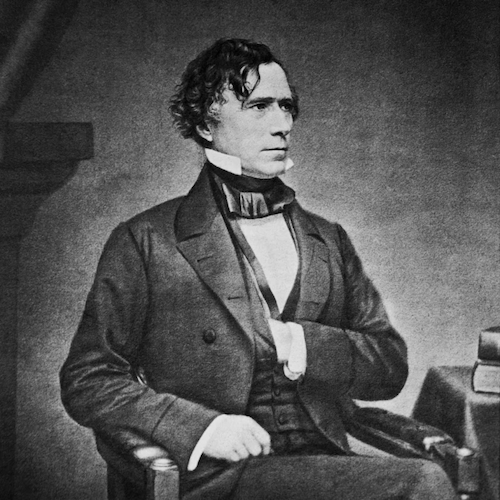Franklin Pierce was the 14th President of the United States from 1853 to 1857. Legislation he encouraged set the United States on the path to civil war.
Early Life
Pierce was born in Hillsborough, New Hampshire on November 23, 1804. His father, Benjamin Pierce was a governor of New Hampshire. He attended Phillips Exeter Academy, Bowdoin College and Northampton Law School. He married Jane Means Appleton in 1834. The union produced three sons, all of whom died in childhood.
Early Career
Pierce was elected to the New Hampshire legislature, and two years later became Speaker. Soon after, he went to Washington as a U.S. Congressman. At the age of 32, he was elected to the U.S. Senate. However, his wife was very unhappy and in ill health, so Pierce left the Senate in 1842. He concentrated on his law practice in Concord, NH for the next 10 years. He served in the Army in the Mexican-American War, rising to the rank of brigadier general.
Pierce was personally opposed to slavery, but believed that fanatics in the abolitionist movement would lead to the end of the Union. He supported the Compromise of 1850, which included the Fugitive Slave Act, the end of the slave trade in Washington D.C., and the admission of California as a free state.
Presidency
The 1852 Democratic Convention was deadlocked when Pierce emerged as the Democratic presidential candidate. He accepted the nomination, but thought he had no chance of winning. His wife opposed his candidacy. Before he took office, his family was in a train wreck that killed his 11-year-old son.
During Pierce’s administration, the U.S. bought 45,000 square miles of land from Mexico.
The most notable event in his presidency was the Kansas-Nebraska Act of 1854. The act allowed settlers of Kansas and Nebraska to decide whether slavery would be allowed within their territories. Proslavery and abolitionists fought, leading to violence and bloodshed, and the area became known as “Bleeding Kansas.” This accelerated the country’s move towards civil war and led to the founding of the Republican Party. Pierce was not able solve the slavery issue and became increasingly viewed as an indecisive and ineffective president.
He was denied the Democratic nomination in 1856, and returned to New Hampshire. He died in obscurity on October 8, 1869.






